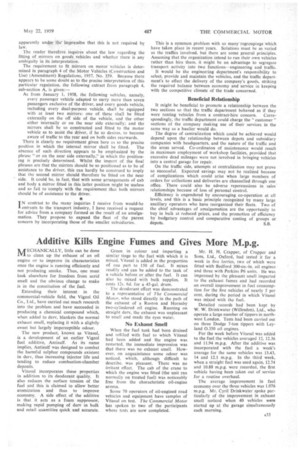Additive Kills Engine Fumes and Gives More M.p.g.
Page 67

If you've noticed an error in this article please click here to report it so we can fix it.
MECHANICALLY, little can be done to clean up the exhaust of an oil engine or to improve its characteristics once the engine is running efficiently and not producing smoke. Thus, one must look elsewhere for freedom from acrid smell and the obvious change to make is in the constitution of the fuel.
Extending their interest in the commercial-vehicle field, the Vigzol Oil Co., Ltd., have carried out much research into the problem and have succeeded in producing a chemical compound which, when added to derv, blankets the normal exhaust smell, replacing it with a slightly sweet but largely imperceptible odour, The new product, known as Vitasul, is a development of an earlier Vigzol fuel additive, Antisulf. As its name implies, Antisulf was designed to combat the harmful sulphur compounds existent in derv, thus increasing injector life and tending to reduce combustion-chamber deposits.
Vitasul incorporates these properties in addition to its deodorant quality. It also reduces the surface tension of the fuel and this is claimed to allow better atomization and thus to improve economy. A side effect of the additive is that it acts as a foam suppressor, making rapid pumping of dery in bulk and retail quantities quick and accurate. Green in colour and imparting a similar tinge to the fuel with which it is mixed, Vitasul is added in the proportion of one part to 150 of fuel. It mixes readily and can be added to the tank of a vehicle before or after the fuel. It can also be mixed with bulk supplies. It costs 12s. 6d. for a 43-gal. drum.
The deodorant effect was demonstrated to a representative of The Commercial Motor, who stood directly in the path of the exhaust of a Ruston and Hornsby two-cylindered oil engine. Running on straight derv, the exhaust was unpleasant to smell and made the eyes water.
No Exhaust Smell
When the fuel tank had been drained and refilled with fuel to which Vitasul had been added and the engine was restarted, the immediate impression was that there was no exhaust smell. However, on acquaintance some odour was noticed, which, although difficult to describe, was pleasant. There was no irritant effect. The cab of the crane to which the engine was fitted (the unit ran normally on treated fuel) was noticeably free from the characteristic oil-engine aroma.
Some 70 operators of oil-engined road vehicles and equipment have samples of Vitasul on test. The Commercial Motor has spoken to two of the participants whose tests are now completed. Mr. H. H. Crapper, of Crapper and Sons, Ltd., Oxford, had tested it for a week in five lorries, two of which were fitted with Bedford 300-cu.-in, oil engines and three with Perkins P6 units. He was impressed by the pleasant smell imparted to the exhaust fumes and had recorded an overall improvement in fuel consumption for the five vehicles of nearly 5 per cent, during the period in which Vitasul was mixed with the fuel.
Detailed records had been kept by W. W. Drinkwater (Willesden), Ltd., who operate a large number of tippers in northwest London. Tests had been carried out on three Dodge 7-ton tippers with Leyland 0.350 oil engines.
For the week before Vitasul was added to the fuel the vehicles averaged 12, 12.36 and 11.94 m.p.g. After the additive was incorporated with the fuel a week's average for the same vehicles was 13.43, 14 and 12.1 m.p.g. In the third week, when a straight fuel was used again, 12.74 and 10.88 m.p.g. were recorded, the first vehicle having been taken out of service for a routine overhaul.
The average improvement in fuel economy over the three vehicles was 1.076 m.p.g. Mr. Cyril Drinkwater spoke particularly of the improvement in exhaust smell noticed when 40 vehicles were started up at the garage simultaneously each morning.


































































































